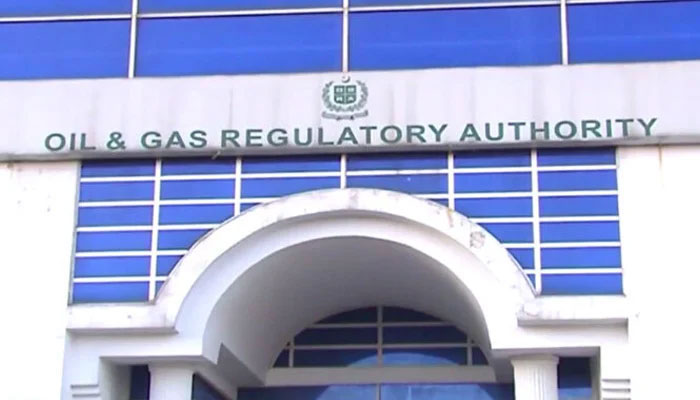Ogra halts diesel cargo berthing after OMC violates import schedule
38,000-tonne cargo, originally scheduled for import at end of Sep 2024, arrived ahead of time on Sep 1
ISLAMABAD/KARACHI: The early import of diesel cargo by an oil marketing company (OMC) has sparked significant concern within the Oil and Gas Regulatory Authority (Ogra).
The 38,000-tonne cargo, originally scheduled for import at the end of September 2024, arrived ahead of time on September 1, 2024. This unexpected development has threatened the carefully coordinated National Oil Supply Chain (NOSC) and prompted Ogra to take immediate action.
In a letter dated August 30, 2024, Ogra expressed dissatisfaction with the OMC’s actions, noting that the company’s decision to bring in the diesel shipment early violated the decisions made during the Product Review Meeting (PRM) held on August 12-13, 2024. The cargo, named ‘MT NCC BADER,’ was authorised for import specifically to address the anticipated diesel shortage during October and November when the Pak-Arab Refinery (PARCO), the country’s largest refinery, will undergo maintenance.
Ogra’s letter, addressed to the OMC’s chief in Pakistan, stressed that the early arrival of cargo could destabilise the NOSC. The regulator urged the OMC to reroute the cargo or hold it at the outer anchorage until the last week of September to maintain the stability of national supply.
Moreover, Ogra has asked the Petroleum Division’s oil director general to coordinate with the Ministry of Maritime Affairs to prevent the vessel’s berthing until further notice. This directive highlights the seriousness of the situation, as Ogra aims to avoid any disruption in the country’s fuel supply strategy.
The decision to import diesel in September was initially approved with the understanding that PARCO’s maintenance would require additional supply in October and November. However, with over 750,000 metric tonnes of high-speed diesel already available in the country, and a daily consumption rate of around 15,000 metric tonnes, the early import has raised concerns among industry stakeholders.
Refinery operators argue that the surplus diesel stock could impact their operations.
Industry analysts estimate that the average cost of importing 50,000 metric tonnes of high-speed diesel (HSD) is approximately $38 million.
With planned imports for September totaling 183,000 metric tonnes, the outflow of foreign exchange is projected to be around $140 million. Given that the country’s monthly HSD demand is about 500,000 metric tonnes, with 425,000 metric tonnes supplied by local refineries, many believe there is no immediate need for additional imports.
-
 Kim Kardashian And Lewis Hamilton Make First Public Appearance As A Couple At Super Bowl 2026
Kim Kardashian And Lewis Hamilton Make First Public Appearance As A Couple At Super Bowl 2026 -
 Romeo And Cruz Beckham Subtly Roast Brooklyn With New Family Tattoos
Romeo And Cruz Beckham Subtly Roast Brooklyn With New Family Tattoos -
 Meghan Markle Called Out For Unturthful Comment About Queen Curtsy
Meghan Markle Called Out For Unturthful Comment About Queen Curtsy -
 Bad Bunny Headlines Super Bowl With Hits, Dancers And Celebrity Guests
Bad Bunny Headlines Super Bowl With Hits, Dancers And Celebrity Guests -
 Insiders Weigh In On Kim Kardashian And Lewis Hamilton's Relationship
Insiders Weigh In On Kim Kardashian And Lewis Hamilton's Relationship -
 Prince William, Kate Middleton Private Time At Posh French Location Laid Bare
Prince William, Kate Middleton Private Time At Posh French Location Laid Bare -
 Stefon Diggs Family Explained: How Many Children The Patriots Star Has And With Whom
Stefon Diggs Family Explained: How Many Children The Patriots Star Has And With Whom -
 ‘Narcissist’ Andrew Still Feels ‘invincible’ After Exile
‘Narcissist’ Andrew Still Feels ‘invincible’ After Exile -
 Shamed Andrew ‘mental State’ Under Scrutiny Amid Difficult Time
Shamed Andrew ‘mental State’ Under Scrutiny Amid Difficult Time -
 Bad Bunny's Super Bowl Halftime Show: What Time Will He Perform Tonight?
Bad Bunny's Super Bowl Halftime Show: What Time Will He Perform Tonight? -
 Where Is Super Bowl 2026 Taking Place? Everything To Know About The NFL Showdown
Where Is Super Bowl 2026 Taking Place? Everything To Know About The NFL Showdown -
 Chris Pratt Explains Why He And Katherine Schwarzenegger Did Premarital Counseling
Chris Pratt Explains Why He And Katherine Schwarzenegger Did Premarital Counseling -
 Drake 'turns Down' Chance To Hit Back At Kendrick Lamar At Super Bowl
Drake 'turns Down' Chance To Hit Back At Kendrick Lamar At Super Bowl -
 Sarah Ferguson Had A ‘psychosexual Network’ With Jeffrey Epstein
Sarah Ferguson Had A ‘psychosexual Network’ With Jeffrey Epstein -
 Miranda Kerr Shares The One Wellness Practice She Does With Her Kids
Miranda Kerr Shares The One Wellness Practice She Does With Her Kids -
 Czech Republic Supports Social Media Ban For Under-15
Czech Republic Supports Social Media Ban For Under-15




